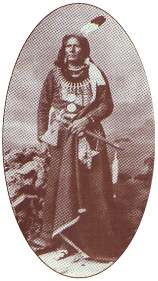Ponca Chief, Standing Bear
category : Ethnic Heritage
 Standing Bear won the battle for himself and for all Native Americans to become "persons" under United States law. His fight for his land and his dignity has been recorded as one of the first victories for civil rights in America.
Standing Bear won the battle for himself and for all Native Americans to become "persons" under United States law. His fight for his land and his dignity has been recorded as one of the first victories for civil rights in America.Standing Bear was a chieftain of the Ponca Tribe, a peaceful nation of farmers and hunters. In January, 1877, the Poncas were told by Indian Inspector Edward C. Kemble that they must leave their homeland along the Niobrara River in northeastern Nebraska and move to the Indian
Territory in Oklahoma.
Standing Bear declared, "We do not wish to sell this land, and we think that no man has a right to take it from us. Here we will live, and here we will die."
However, a small group of Poncas were forced to accompany Kemble on an inspection of the "Warm Lands" in Oklahoma. Unaccustomed to the warmer climate, some sickened. When Standing Bear saw their plight and the land offered, he refused to bring his people south. Kemble abandoned
them to a 500-mile winter walk home to Nebraska without money food and adequate clothing.
Upon their return to the Niobrara two months later, they found soldiers waiting to remove them to the Indian Territory by force. On May 21, 1878, the Ponca people were driven out of their village like cattle. Their belongings were confiscated.
In the heat of summer - July 9, 1878 - the tribe reached Oklahoma, only to find that the U.S. government had made no provision for their support.
It was too late to plant crops, they had no seed, no provisions, no familiar plants for medicines and foods, the heat, and a number of other problems resulted in the death of 158 of the 730 tribal members who made the trip. Standing Bear's 12-year-old son was among those who died.
Honoring a deathbed promise to his son that the boy would be buried on the Niobrara River in Nebraska, Standing Bear began the return journey in January, 1879. He and his 30 followers endured blizzard conditions. Some died along the way, but the rest made it to Nebraska with the help of other tribes along the way.
Upon reaching Nebraska, they were arrested by General George Crook's soldiers. Crook, however, was so outraged by the band's plight that he enlisted the help of journalist Thomas H. Tibbles to raise public support for the tribe's plight and procure a legal defense for Standing Bear.
Standing Bear's defense was based on the 14th amendment which reads, "nor shall any State deprive any person of life, liberty, or property, without due process of law."
During the ensuing trial Standing Bear made his plea for recognition of his basic humanity, saying "I am a man. The same God made us both." Judge Dundy ruled in favor of Standing Bear, declaring, " ... the question cannot be open to serious doubt. Webster describes a person as, '... a living
human being ... an individual of the human race.' This is comprehensive enough, it would seem, to include even an Indian."
Standing Bear had won - for himself, and for all Native Americans and changed the course of history.
By KATHY ZEHR
Ponca City News Staff Writer
Come visit us in Ponca City, Oklahoma